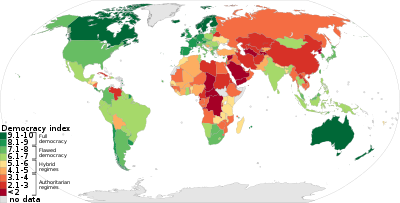Democracy
Democracie (or democracy) is a poleetical form o govrenment in which governin pouer is derived frae the fowk, aither bi direct referendum (direct democracie) or bi means o electit representatives o the fowk (representative democracie).[1] The term comes frae the Greek: δημοκρατία – (dēmokratía) "rule o the fowk",[2] which wis coined frae δῆμος (dêmos) "fowk" an κράτος (Kratos) "pouer", in the middle o the 5t-4t centurie BC tae denote the poleetical seestems then existin in some Greek ceetie-states, notablie Athens follaein a popular uprisin in 508 BC.[3] Even tho thare is nae specific, universallie acceptit definition o 'democracie',[4] equalitie an freedom hae been identified as important characteristics o democracie syne ancient times.[5] Thir principles are reflectit in aw ceetizens bein equal afore the law an haein equal access tae pouer. For ensaumple, in a representative democracie, iverie vote haes equal wecht, nae restrictions can apply tae onyane wantin tae acome a representative, an the freedom o its ceetizens is secured bi legitimized richts an liberties which are generallie protectit bi a constitution.[6][7]

Thare are several varieties o democracie, some o which provide better representation an mair freedoms for thair ceetizens than ithers.[8][9] Housomeivver, if onie democracie is no carefullie legislatit – throu the uise o balances – tae avoid an uneven distribution o poleetical pouer, sic as the separation o pouers, then a branch o the seestem o rule coud accumulate pouer sicweys acome undemocratic.[10][11][12]
The "majoritie rule" is aften describit as a characteristic featur o democracie, but athoot governmental or constitutional protections of individual liberties, it is possible for a minoritie o individuals tae be oppressed bi the "tyrannie o the majoritie". An essential process in representative democracies is competitive elections that are fair baith substantively[13] an procedurallie.[14] Furthermore, freedom o poleetical expression, freedom o speech, an freedom o the press are essential sae that ceetizens are informed an able tae vote in thair personal interests.[15][16]
Popular sovereigntie is common but no a universal motivatin subject for establishin a democracie.[17] In some kintras, democracie is based on the philosophical principle o equal richts. Monie fowk uise the term "democracie" as shorthand for liberal democracie, which mey include additional elements sic as political pluralism; equalitie afore the law; the right to petition elected officials for redress of grievances; due process; civil liberties; human richts; an elements o ceevil societie ootside the govrenment.
In the Unitit States, separation o pouers is aften cited as a supportin attribute, but in ither kintras, sic as the Unitit Kinrick, the dominant philosophie is parliamentarie sovereigntie (tho in practice judicial independence is generallie maintained). In ither cases, "democracie" is uised tae mean direct democracie. Tho the term "democracie" is typicallie uised in the context o a poleetical state, the principles are applicable tae private organizations an ither groups an aa.
Democracie haes its oreegins in Auncient Greece.[18][19] Housomeivver ither culturs hae significantlie contributit tae the evolution o democracie sic as Ancient Rome,[18] Europe,[18] an North an South Americae.[20] The concept o representative democracie arose largelie frae ideas an institutions that developed durin the European Middle Ages an the Age o Enlichtenment an in the American an French Revolutions.[21] Democracie haes been cried the "last form of government" an haes spread considerably across the globe.[22] The richt tae vote haes been expandit in monie Jurisdictions ower time frae relatively narrae groups (sic as wealthie men o a parteecular ethnic group), wi New Zealand the first naition tae grant universal suffrage for aw its ceetizens in 1893.
References
eedit- ↑ "Democracy Conference". Innertemple.org.uk. Retrieved 22 August 2010.
- ↑ "Demokratia, Henry George Liddell, Robert Scott, "A Greek-English Lexicon", at Perseus". Archived frae the original on 14 September 2007. Retrieved 14 September 2007.
- ↑ Democracy is people who rule the government directly.BBC History of democracy
- ↑ Liberty and justice for some at Economist.com
- ↑ "Aristotle, Politics.1317b (Book 6, Part II)". Perseus.tufts.edu. Retrieved 22 August 2010.
- ↑ R. Alan Dahl, I. Shapiro, J. A. Cheibub, The Democracy Sourcebook, MIT Press 2003, ISBN 0262541475, Google Books link
- ↑ M. Hénaff, T. B. Strong, Public Space and Democracy, University of Minnesota Press, ISBN 0816633878
- ↑ G. F. Gaus, C. Kukathas, Handbook of Political Theory, SAGE, 2004, p. 143-145, ISBN 0761967877, Google Books link
- ↑ The Judge in a Democracy, Princeton University Press, 2006, p. 26, ISBN 069112017X, Google Books link
- ↑ A. Barak, The Judge in a Democracy, Princeton University Press, 2006, p. 40, ISBN 069112017X, Google Books link
- ↑ T. R. Williamson, Problems in American Democracy, Kessinger Publishing, 2004, p. 36, ISBN 1419143166, Google Books link
- ↑ U. K. Preuss, "Perspectives of Democracy and the Rule of Law." Journal of Law and Society, 18:3 (1991). pp. 353–364
- ↑ Substantively fairness means equalitie among all citizens in all respects i.e. equalitie in chances, in starting point etc.
- ↑ Procedural fairness means that the rules o the elections are clear an set in advance
- ↑ A. Barak,The Judge in a Democracy, Princeton University Press, 2006, p. 27, ISBN 069112017X, Google Books link
- ↑ H. Kelsen, Ethics, Vol. 66, No. 1, Part 2: Foundations of Democracy (Oct., 1955), pp. 1–101
- ↑ Benhenda, M. "Liberal Democracy and Political Islam: the Search for Common Ground".
- ↑ a b c John Dunn, Democracy: the unfinished journey 508 BC – 1993 AD, Oxford University Press, 1994, ISBN 0198279345
- ↑ Kurt A. Raaflaub, Josiah Ober, Robert W. Wallace, Origin of Democracy in Ancient Greece, University of California Press, 2007, ISBN 0520245628, Google Books link
- ↑ Weatherford, J. McIver (1988). Indian givers: how the Indians of the America transformed the world. New York: Fawcett Columbine. pp. 117–150. ISBN 0-449-90496-2.
- ↑ "Democracy". Encyclopædia Britannica.
- ↑ "The Global Trend" chart on Freedom in the World 2007: Freedom Stagnation Amid Pushback Against Democracy published by Freedom House
| Wikimedia Commons haes media relatit tae Democracy. |